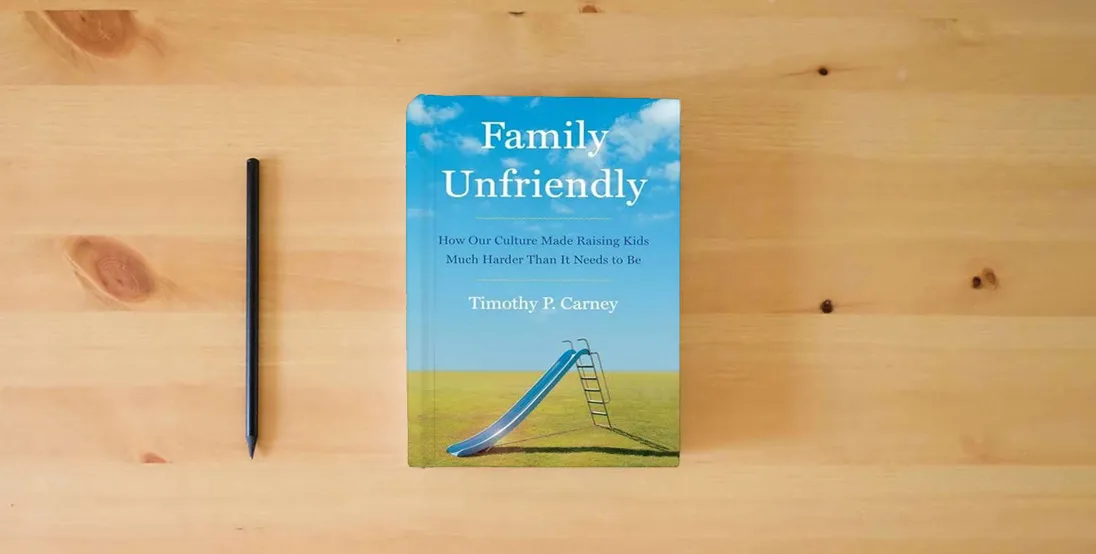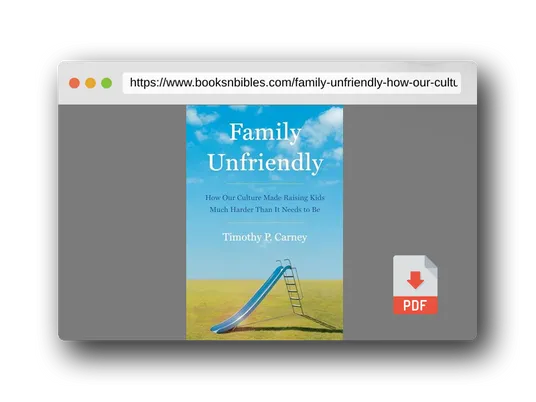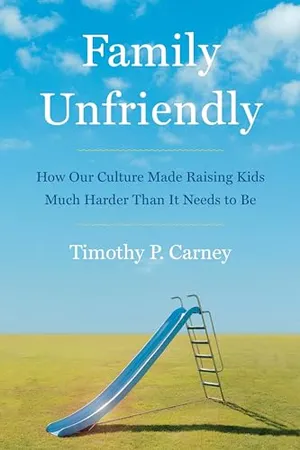Family Unfriendly: How Our Culture Made Raising Kids Much Harder Than It Needs to Be
This bookThe book "Family Unfriendly: How Our Culture Made Raising Kids Much Harder Than It Needs to Be" was written by Timothy P Carney and it has 368 pages for you to enjoy.
I want this book! ⬇️Here on Books & Bibles you will find a lot of relevant information about the book Family Unfriendly: How Our Culture Made Raising Kids Much Harder Than It Needs to Be.
Reviews, Abstracts, Synopsis, PDF, Data Sheets and the opportunity to Read Online. Browse the site by scrolling down this page and enjoy!
Synopsis, Summary or DescriptionNext Section

Family Unfriendly is a book by Timothy P. Carney that argues that American culture has become increasingly hostile to families. Carney cites a number of factors that have contributed to this trend, including the decline of marriage, the rise of single-parent households, and the increasing number of women in the workforce. He argues that these factors have made it more difficult for parents to raise children and that the government and society need to do more to support families.
Carney begins by defining what he means by "family unfriendly." He argues that a family-friendly culture is one that values children and supports parents. He then discusses the ways in which American culture has become less family-friendly in recent decades. He cites the following statistics:
- The divorce rate has increased from 10% in 1960 to 50% today.
- The number of single-parent households has increased from 10% in 1960 to 28% today.
- The number of women in the workforce has increased from 33% in 1960 to 57% today.
Carney argues that these trends have made it more difficult for parents to raise children. He argues that single parents have less time and money to spend on their children, and that children who grow up in single-parent homes are more likely to experience poverty, crime, and academic problems. He also argues that the increasing number of women in the workforce has led to a decline in the amount of time that mothers spend with their children.
Carney concludes by arguing that the government and society need to do more to support families. He proposes a number of policies that would make it easier for parents to raise children, including paid parental leave, affordable childcare, and tax breaks for families. He also argues that we need to change our cultural attitudes toward families. We need to start valuing children and supporting parents more.
Family Unfriendly is a well-written and thought-provoking book. Carney makes a strong case that American culture has become increasingly hostile to families. He offers a number of concrete proposals for how we can make our society more family-friendly. This book is a must-read for anyone who is concerned about the future of the American family.
Book specifications (Data Sheet)Next Section
We have separated for you, through this data sheet, the main features of this book as extra information for you to decide whether to buy or not.
| Title | Family Unfriendly: How Our Culture Made Raising Kids Much Harder Than It Needs to Be |
| Author(s) | Timothy P Carney |
| ISBN | 9780063236462 006323646X |
| Publisher | Harper |
| Page Count | 368 pages |
| Publication Date | Monday, March 18, 2024 |
| Is it possible to read online? | Check here |
Book Family Unfriendly: How Our Culture Made Raising Kids Much Harder Than It Needs to Be in PDFNext Section

A PDF file is a portable document that can be opened on any platform without losing its original features. It is often used for exchanging text documents (such as books, magazines, newspapers) and is widely spread on the internet.
We provide here in Books & Bibles a PDF version of the general information about this book, so you can refer and share it with your friends. Click the button below to save the shareable PDF file we created for this book.
Where can I buy the physical version of this book? What is the price?Next Section
We have researched in several bookstores in the country and came to the conclusion that the most suitable store to buy the book Family Unfriendly: How Our Culture Made Raising Kids Much Harder Than It Needs to Be is the Amazon store.
Amazon has a very secure policy and several payment options, so you can buy your book safely and be sure that it will arrive at your home with all the care and quality.
| Store | Price | |
|---|---|---|
 ⭐ Recommended Store ⭐ Recommended Store | ⭐ Recommended Store | Check the price |
Read online the book Family Unfriendly: How Our Culture Made Raising Kids Much Harder Than It Needs to BeNext Section
Reading books online has become increasingly common among young people who grew up after the advent of the internet. One of the best devices to do this type of reading is the Kindle Reader, which allows you to read books online even in a place with lots of light. If you have the opportunity, it is worth using as it will not harm your eyesight.

Authors and publishers often make reading available online and sometimes take it offline. If you would like to check whether the book Family Unfriendly: How Our Culture Made Raising Kids Much Harder Than It Needs to Be is available to read online, please click on the button below.
Note to the Author Timothy P Carney
It is important to point out to the author or person responsible for the book (Timothy P Carney) that we are against piracy. The purpose of this site is to make users aware of the authors' books, so that they can sell even more.
That being said, we provide the user with the cover photo and technical sheet of the book. We also offer a PDF file containing only a brief summary of the book, with purchase links, in addition to online reading, which is a means of assisting the reader in the decision-making process.
